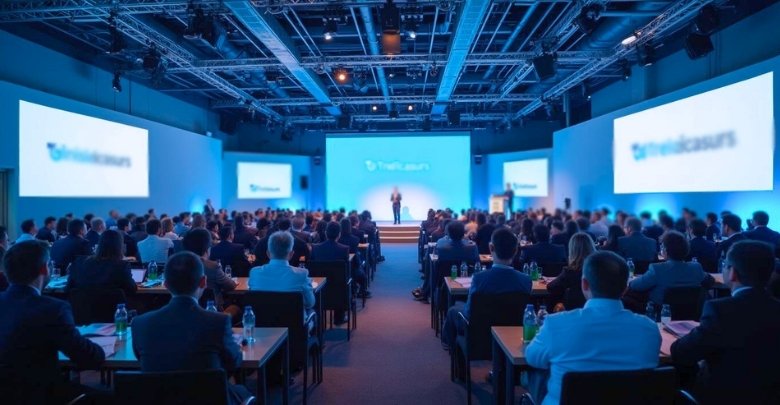There are many opportunities for networking, education, and growth when you attend international conferences in the USA. Whether you’re a resident or a non-resident, the events will allow you to expand your professional connections and help you gain valuable insights. But before you pack your bags, you might be asking yourself, “Can I go to a business conference in USA?”
Yes, you can go to a business conference in the USA. Residents of the USA can attend freely without any additional requirements. However, non-residents may need to secure a visa, such as a B1/B2 visa, to attend these conferences.
Make sure you check the entry requirements, conference registration details, and any travel restrictions before registering. Check out our article on attending a business conference in the USA and get the most out of your time there!
Can I Go to a Business Conference in USA?
Yes, you can attend a business conference in the USA. However, the process differs for residents and non-residents. To ensure a smooth experience, follow these essential steps for planning and attending your conference.

Step 1: Determine Your Eligibility
Before making any arrangements, confirm whether you need a visa. U.S. residents can attend without restrictions, while non-residents usually require a B1/B2 visa for business purposes. Reviewing your eligibility early helps avoid unexpected travel issues. Always check the latest travel policies for updates.
Step 2: Choose the Right Conference
Selecting the right event is crucial for maximizing opportunities. Research industry-specific conferences that align with your goals. Consider the location, agenda, and networking potential before committing. Register early to secure your spot and access early-bird discounts.
Step 3: Apply for a Visa (If Required)
Non-residents must apply for the appropriate visa well in advance. The B1/B2 visa covers business-related visits, including conferences. Schedule an interview at the U.S. embassy and prepare documents like an invitation letter, financial proof, and travel itinerary. Processing times vary, so apply early.
Step 4: Complete Conference Registration
Once your visa is approved (or if you’re a resident), finalize your event registration. Most conferences offer online registration with different ticket options. Ensure you understand the pricing, access levels, and any pre-event requirements. Keep confirmation emails for reference at the venue.
Step 5: Plan Your Travel and Accommodation
Booking flights and accommodations early ensures better deals. Choose a hotel near the conference venue for convenience. Consider transportation options like public transit or car rentals for easy mobility. Travel insurance can provide added security in case of cancellations or emergencies.
Step 6: Prepare Necessary Documents
Carrying the right documents is essential for a hassle-free experience. Bring a valid passport, visa (if required), conference pass, and ID. A printed or digital itinerary helps keep track of schedules. If you’re speaking or presenting, ensure all materials are ready beforehand.
Step 7: Make the Most of the Event
Taking part in a business conference in USA is not just about listening to speakers. Engage with attendees, participate in discussions, and exchange business cards. Take notes on key insights and follow up with connections afterward. Maximizing your experience can open doors to new opportunities.
How do You benefit from attending a US business conference?
Business conferences in the U.S. can open doors to new business opportunities. It’s a great way to learn, connect, and grow professionally. Recognizing the key benefits of attending a US Business Conference will help you make the most of the event. You can benefit from attending US business conferences in the following ways:
Expand Your Professional Network
Meeting like-minded professionals helps build strong industry relationships. Conversations at these events can lead to potential partnerships and collaborations. Exchanging contact details keeps you connected beyond the conference. Meaningful connections may open doors to new career opportunities.
Gain Industry Knowledge and Insights
Expert speakers share the latest trends and strategies in their fields. Learning from them enhances your understanding of industry advancements. Real-world case studies provide practical solutions to business challenges. Staying updated keeps you ahead in a competitive market.
Find New Business Opportunities
Conferences introduce you to innovative ideas and investment possibilities. Engaging with exhibitors helps you explore fresh business solutions. Understanding market trends allows you to identify potential growth areas. These events offer direct access to industry leaders and decision-makers.
Improve Your Skills and Expertise
Workshops and panel discussions provide hands-on learning experiences. Interactive sessions allow you to develop problem-solving and leadership skills. Attending training programs enhances your professional expertise. Gaining new skills increases your confidence and career prospects.
Enhance Your Brand and Visibility
Being present at industry events enhances your professional credibility. Speaking or participating in discussions establishes you as a thought leader. Sharing insights helps you gain recognition among peers. Increased visibility can lead to better business and career opportunities.
Stay Motivated and Inspired
Engaging with successful professionals renews your passion for work. Listening to inspiring stories encourages you to push your limits. Fresh perspectives help you think creatively about business challenges. A motivated mindset drives you toward long-term success.
Does Attending a Business Conference in the USA Cost a Lot?
Yes, attending a business conference in the USA can be expensive. Costs vary depending on the conference location, duration, and registration fees. On top of registration, travel expenses like flights and accommodation add up quickly.
In addition to basic costs, you may need to consider meals and transportation during the event. Some conferences offer discounts for early registration, but the fees can still be substantial. Don’t forget the business conference visa cost, which might also add to your budget if you’re traveling from outside the USA.
However, the benefits often outweigh the costs. Attending a conference provides valuable networking, learning, and potential career opportunities. If you plan ahead and take advantage of discounts, you can reduce overall expenses while maximizing the event’s value.
What Are the Restrictions of a USA Business Conference Visa?
A USA business conference visa allows entry to professional events but comes with certain limitations. Understanding these restrictions helps avoid legal issues during your visit. Here are the key limitations every applicant must know:
- No Full-Time Employment Allowed: Working for a U.S. company under this visa is strictly prohibited. It only permits participation in business-related activities like meetings and conferences.
- Limited Stay Duration: The visa grants only a temporary stay for the event. Overstaying beyond the permitted time can lead to legal consequences.
- No Educational Enrollment: Attending a degree or full-time academic program is not allowed. The visa is strictly for business-related purposes, not formal education.
- Restricted to Business Activities Only: Engaging in paid performances or contract work is prohibited. It is meant for attending events, negotiations, and networking opportunities.
- No Long-Term Business Operations: Setting up or managing a business in the U.S. is not allowed. The visa only permits temporary visits for business conferences.
- Frequent Travel May Raise Concerns: Multiple short visits within a short period may trigger extra scrutiny. Immigration officers might question the purpose and necessity of repeated travel.
- Dependents Have Separate Visa Requirements: Family members cannot automatically enter under your visa. They must apply for their own appropriate visa type to accompany you.
- Extension Requests Are Not Guaranteed: Extending your stay requires strong justification and approval. The decision depends on specific circumstances, and not all requests get accepted.
USA Business Conference Visa Denial Reasons and How to Avoid Them
Applying for a USA business conference visa can sometimes be a challenging process. Several factors could lead to a visa denial, causing frustration. Knowing the reasons for denial can help you prepare and prevent mistakes. Listed below are some reasons why your USA Business Conference Visa was denied and how to avoid them:
Insufficient Proof of Purpose
Failing to clearly demonstrate the reason for your visit can lead to denial. Ensure your application includes detailed conference information. Attach invitations, event details, and your intended participation to show the trip’s legitimacy. Clear documentation proves your business intentions.
Lack of Ties to Home Country
If you can’t prove strong connections to your home country, the visa may be denied. Strong ties ensure you’ll return after the conference. Provide evidence of family, work, or property to show you have reasons to go back. This reassures officials about your intentions.
Inadequate Financial Proof
Visa officers may deny your application if you cannot show enough funds for your stay. Financial stability is essential for covering expenses. Provide recent bank statements, pay stubs, or financial guarantees to demonstrate sufficient resources. Ensure your financial proof is clear and complete.
Incorrect or Incomplete Application
Any mistake or missing document can delay or deny your visa. Review the business visa requirements for conference attendance to ensure full compliance. Double-check all forms and documents before submission to avoid issues. Correct any discrepancies to prevent unnecessary delays.
Previous Immigration Violations
Any past violations of U.S. immigration law can affect your visa chances. Be transparent about your immigration history to avoid complications. Visa officers review past records, and honesty can sometimes lead to favorable decisions. Past mistakes could still impact your current application.
Lack of Strong Professional Standing
Visa denial may occur if your professional background is unclear or unconvincing. Provide evidence of your job, company, or conference relevance. Show how attending the event aligns with your career development. Highlight your professional standing to reinforce the importance of your visit.
Can You Extend Your Stay After the Business Conference?
Yes, you can apply to extend your stay after a business conference in the USA. However, approval is not guaranteed and depends on eligibility. Submitting a request before your current visa expires is necessary to avoid legal issues.
A visa extension requires a valid reason, such as additional business meetings or training sessions. The application process includes filing Form I-539 with supporting documents. Providing strong evidence increases the chances of getting approval from immigration authorities.
If the extension is denied, leaving before your visa expires is important. Overstaying may result in future visa complications or entry bans. By planning ahead, you can avoid unnecessary legal problems and ensure a smooth process.
Frequently Asked Questions
Taking part in a business conference in the USA can be both exciting and valuable. However, many professionals have concerns about the process, requirements, and challenges. Listed below are some frequently asked questions that will help clarify any uncertainties.
Can I Attend a Business Conference in the USA Without a Sponsor?
Yes, you can attend a business conference in the USA without a sponsor. However, you must show financial proof that you can cover expenses. Providing bank statements, employer verification, and a valid reason for attending strengthens your application. A strong financial background improves visa approval chances.
How Early Should I Apply for a Business Conference Visa?
It is best to apply for a visa at least three to six months before the conference. Visa processing times vary based on country and season. Scheduling an early appointment helps avoid last-minute issues. Delays may occur due to additional document requests or background checks.
Can I Attend Multiple Conferences on the Same Visa?
Yes, a B1/B2 visa allows attendance at multiple conferences within its validity period. Ensure all conferences align with the visa’s purpose. If attending several events, carrying proper documentation for each helps during immigration checks. Overstaying or misusing the visa may lead to issues.
Is Travel Insurance Required for a Business Conference Visit?
Travel insurance is not mandatory but highly recommended for international visitors. It covers medical emergencies, trip cancellations, and unforeseen expenses. Unexpected events can disrupt plans, making insurance a smart investment. Some conferences or embassies may suggest getting travel insurance before arrival.
Can I Bring Business Samples or Promotional Material?
Yes, you can bring business materials, brochures, or samples for networking purposes. However, commercial quantities may require additional clearance. Declaring business-related materials at customs prevents legal issues. Understanding U.S. import laws ensures smooth entry with your materials.
Will I Need a Business Invitation Letter for My Visa?
An invitation letter from the conference organizer strengthens your visa application. It confirms your participation and justifies your visit. The letter should include event details, duration, and your role. Although not always mandatory, it increases approval chances.
Bottom Line
Business conferences in the USA offer great opportunities for networking and professional development. Whether you’re asking, “Can I go to a business conference in USA?” the answer is yes, but the process varies for residents and non-residents. USA residents can attend freely, while non-residents often require a visa, such as a B1/B2. Be sure to check entry requirements, conference details, and travel restrictions in advance.
You will have a smooth experience if you are familiar with the visa process, associated costs, and restrictions. By planning early and ensuring all documents are in order, you can make the most of the event while avoiding legal troubles.







